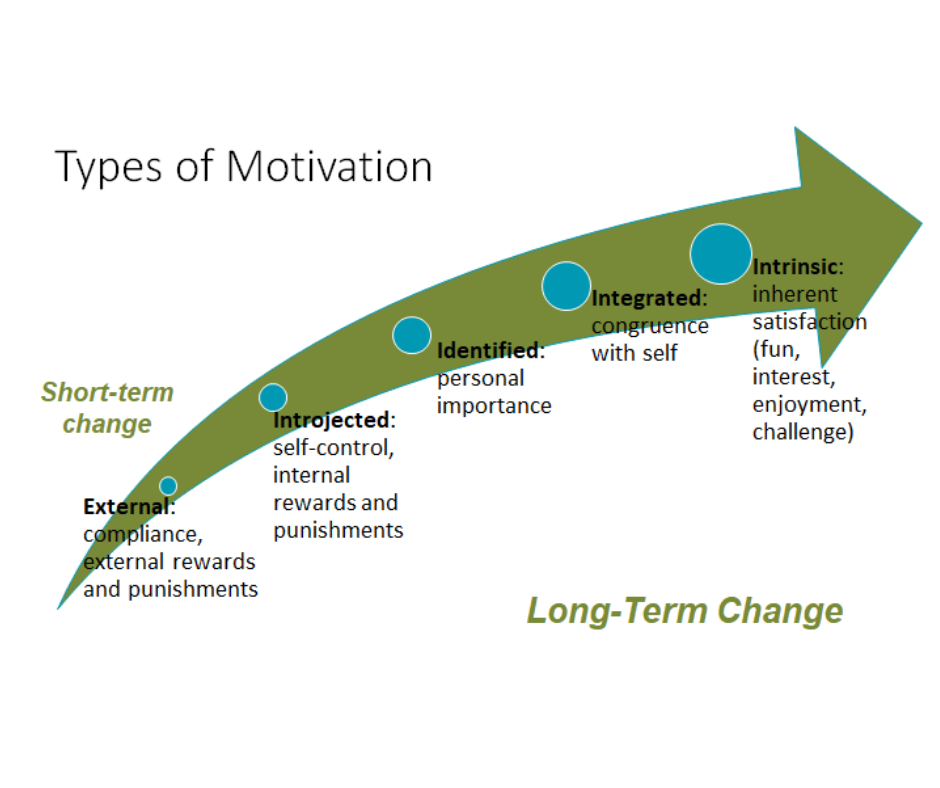Podcast: Play in new window | Download
Subscribe to Motivation Made Easy! Apple Podcasts | Google Podcasts | Spotify | RSS | More
Episode 9. Today’s episode is all about how to shift a habit from a “should” to a “want to.”
Free Resources Mentioned in this Episode:
23 Positive Things to do Besides Eating: A list of 23 quick ideas, with links, most 100% free!
Back on Track Pep Talk: Struggling to regain control of your eating without dieting? Grab this audio guide to walk you through the steps.
Autonomy is the Jam
As someone who worked for years trying to help people lose weight, the stats are simply not inspiring. The cool thing is, we do understand a lot about what TYPE of motivation facilitates long-term behavior change and even weight loss maintenance.
When women participating in a health program had autonomous motivation for exercise, they continued to exercise and maintained their weight loss 3 years later (Silva et al., 2011). So, there is actual data that making this shift translates into behavior change over quite a long period of time.
If that doesn’t encourage you to gain this type of motivation for yourself, I don’t know what would.
What is Autonomous Motivation Really? Do You Always Have to Love What You Are Doing?
A common misconception when I talk about internal/autonomous motivation is that it means you always love everything you are doing all day every day.
Intrinsic motivation does mean that you get inherent satisfaction from the behavior.
But there are other essentially important types of Internal or Autonomous motivation too. These include Integrated and Identified motivation. Essentially, these types boil down to choosing a behavior because it’s consistent with your values and the person you want to be.

5 Ways to Shift from “Should” to “Want To” (or “Choose To”)
Ok Shawn, great. How do I get more autonomous motivation for a habit I want to shift? I’m so glad you asked. Here are some strategies to help with this. The good news? Sometimes it only takes one!
1. Reflect on How Its Helpful to You (Well, first make sure it is helpful, then reflect on this): If you want to get yourself to meal prep more, change how you talk to yourself about it. Instead of telling yourself you “should” do it and if you don’t you’re lazy, remind yourself of how it makes you feel when you do. For example, if you feel more confident, in control, and less stressed on weeks when you meal prep, remind yourself of this.
2. Evaluate How and Where the Shoulds are Coming From: There are a TONS of ways diet culture, societal pressure, and equating weight with health undermine our autonomy and feelings of control. It’s ok to be mad about it, because it likely is holding you back, maybe just a little, or maybe to a great extent from true body respect and health. It makes me incredibly mad when I think about it, all the things I missed out on due to worry about dieting. Give yourself a moment, journal about it, vent to someone you trust. Just naming it and acknowledging it helps to remove it as the barrier that it has been.
3. Remind Yourself You Have a Choice. Here comes the autonomy, my friends. A lot of times the external shoulds from diet culture or society get internalized, this is “introjected motivation” (see image above) which is associated with short term change and sporadic change, at best. This often leads to the “I’ll start again on Monday” thought and fits and starts of taking care of ourselves. Although we are at times fighting an uphill battle, we can reclaim autonomy by changing how we talk to ourselves.
4. Ask Yourself How You Want to Feel? Ask “How do I want to feel at the end of my day or week?” This can work for pesky work tasks you’re avoiding, meal prep, any “should” task that is hanging over your head, really! Humans are motivated by emotions, not logic, so focusing on the feeling in a self supportive way can be incredibly useful.
5. Challenge Perfectionism/All-or-Nothing Thinking: This mindset is PERVASIVE in how we approach weight loss or “lifestyle change.” It’s also pervasive in many other areas of our culture. However, it helps no one learn, growth or become better consistently. Perfectionism is not striving for excellence. You can still strive for high goals, and by shedding perfectionism and adding in flexibility, you can actually often achieve more, without sacrificing your health.
Disclaimer/Warning: Please note, information on my site is for educational/informational purposes only and should never be used in place of medical advice. Always consult with a health care professional.
References
Silva, M. N., Markland, D., Caraca, E. V. Viera, P. N…. Teixeira, P. J. (2011). Exercise autonomous motivation predicts 3-yr weight loss in women. Medicine & Science in Sport & Exercise, 728-737.
